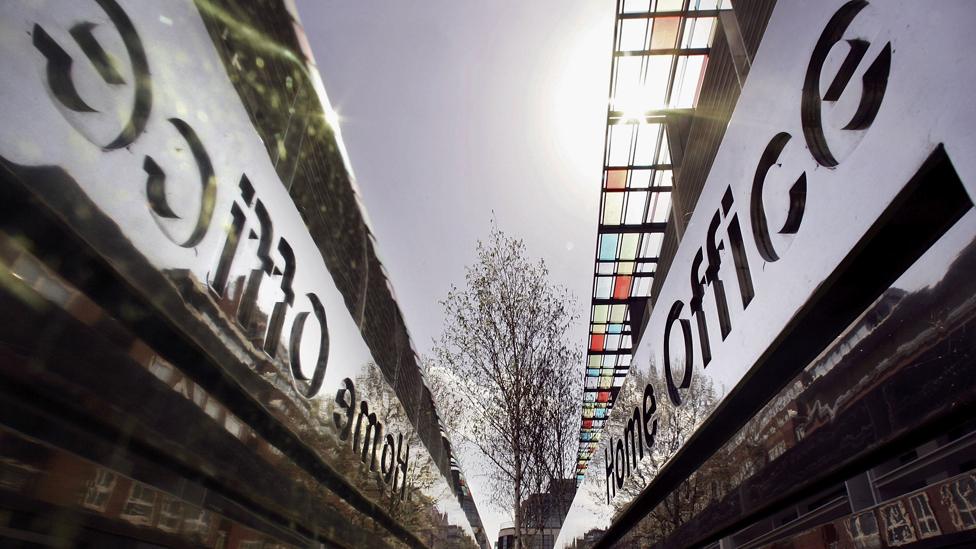Home Office drug strategy: Time to refresh or rethink?
- Published

With deaths from illegal drugs in England and Wales at the highest rate ever recorded one might imagine the Home Office would be desperate to ensure it had a robust and effective strategy for dealing with this current crisis.
So it comes as a surprise to discover that Ministers have quietly abandoned the idea of a formal consultation process in advance of a new drugs strategy later this month.
Traditionally, these five-year plans are put together after weeks of discussions and submissions from experts and the general public.
In 2010 there were 1,850 responses to the drug strategy consultation, including from health professionals, charities, lobby groups, local authorities, government advisors, police and service providers.
Individuals with a close interest in drug policy, often because of the death of a close relative, were also encouraged to participate.
But not this time.
The new five-year strategy has been written with hardly any public discussion at all. You won't find any details on the Home Office website. Nothing.
It is almost as though the department doesn't want to consider alternative options - which is odd because next month UK ministers will be attending the most important United Nations meeting on global drug strategy for decades.
Global policy
The UN General Assembly will gather in New York to try and agree a new global drug policy.
It will decide whether the "war on drugs" should be consigned to history and a new people-centred approach adopted. In short, it is reviewing the international treaty obligations that will frame everything this country does on drugs.
So one might have thought ministers would be keen to get the views of everyone touched by drugs policy in Britain as they prepare for this historic United Nations meeting.
I understand that just two meetings specifically about the new UK drugs strategy have been held by the Home Office. They were behind closed doors and there were no votes, no reports and no minutes published.

Drug-related deaths are at record levels in England and Wales
Around the table were representatives of some of the large organisations that get paid by the government to provide drug treatment. But what about everyone else? Where were the other agencies? Where were the campaigners? Where were the victims?
The Advisory Council on the Misuse of Drugs has been sent a draft of the new strategy and a response will be published. But members are doubtful as to whether the council's concerns at record levels of drug deaths and "disinvestment" in treatment services will have much effect on minister's minds.
The Cabinet Office recently published its "consultation principles", guidance for Whitehall on what kind of consultation process they should conduct ahead of introducing policy or legislation.
The "governing principle" is that the type and scale of the consultation should be in proportion to the potential impact of the proposal.
Little impact
One must assume that in having no formal consultation process, the Home Office has decided the new drugs strategy will have little or no impact. Given record numbers of drug-related deaths in England, with many more people now dying from illicit drug use than in road traffic accidents, this might seem unfortunate. Interestingly, in Wales where they have a different strategy, deaths have been falling.
When I asked the Home Office about all this, their response suggested ministers don't think there is anything to be gained from listening to alternative voices.
"Drugs are illegal where they are harmful to health and society. The UK's approach on drugs remains clear: we must prevent drug use in our communities, help dependent individuals recover, while ensuring our drugs laws are enforced."
"We are currently developing a refreshed drug strategy in line with this approach - working across government and with our external partners. This includes treatment providers, commissioners, service users and our independent experts, the Advisory Council on the Misuse of Drugs."
There you have it. Britain doesn't need a "new" drugs strategy. It just needs to "refresh" the old one - presumably because ministers believe the current approach is operating well.
The Home Office puts out the same line whenever asked about alternative approaches: "Our drugs strategy is working and there is a long-term downward trend in drug misuse in the UK".
But while the second half of the sentence is true, there must be questions about the first half. On an average day, coroners now examine six corpses where cause of death could be described as the failure of the UK's drugs strategy.